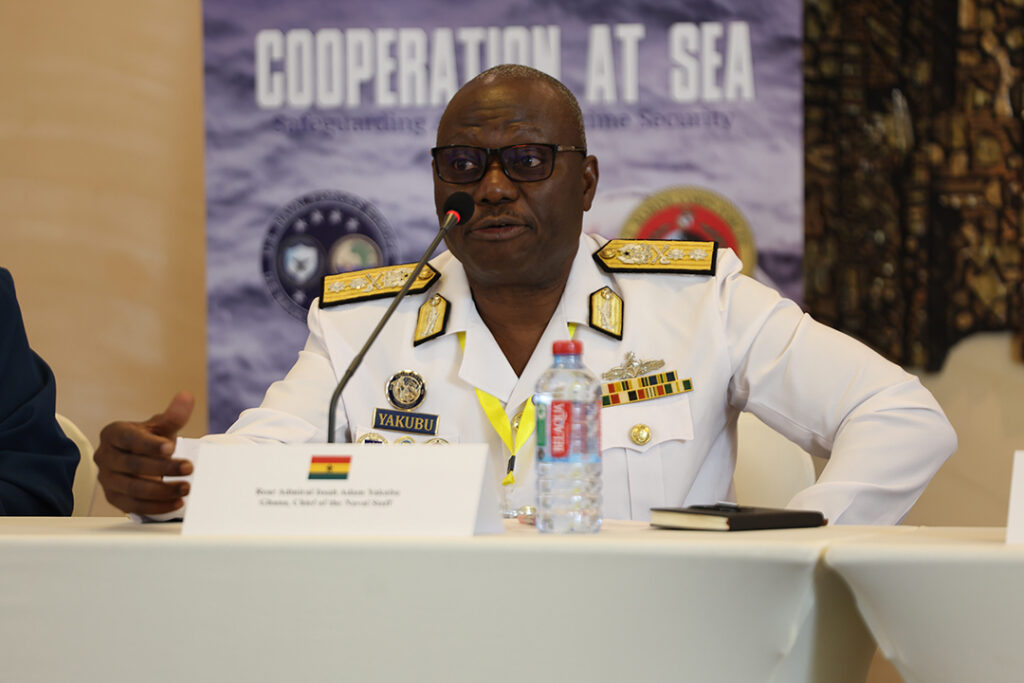ADF STAFF
In August 2023, armed pirates took control of a fishing vessel just outside Sierra Leone’s port. The attack set off a quick response that brought together Sierra Leonean, Liberian and Ivoirian coast guards determined to catch the pirates and free the crew.
As the hijacked boat fled Sierra Leone toward Liberia’s territorial waters, Sierra Leone’s coast guard handed the pursuit to Liberia, which dispatched two patrol boats to intercept the vessel as it got closer to shore.
After a brief firefight, Liberian forces seized the vessel, rescued the 23 crew members and arrested two of the 13 pirates. The others escaped on an inflatable boat. The captured pirates were prosecuted under Liberia’s antipiracy law.
The pirates were charged with criminal conspiracy and armed robbery, among other crimes, Liberia Navy Capt. John Willie told attendees at the 2024 African Maritime Forces Summit and Naval Infantry Leadership Symposium-Africa (AMFS-NILSA) in Accra.
Willie and Commodore Philip Juana, chief of naval staff for Sierra Leone, related the story of the hijacked fishing vessel as an example of how African nations can work together to fight maritime crime along their coasts, particularly in the pirate-plagued Gulf of Guinea.
However, Juana added, cooperation at sea is only part of the equation in fighting maritime crime. Countries must also align their laws with regional and international standards to ensure that people engaged in piracy, illegal fishing, drug trafficking and other maritime crimes are brought to justice.
“Harmonizing laws across the region supports the legal success that keeps eluding us,” Juana said. Without laws to punish pirates and other maritime criminals, security forces will struggle to protect their country’s maritime domains, he added.
Sierra Leone itself lacks the legal framework it needs to prosecute maritime criminals, Juana said. So far, only a few African counties — Benin, Liberia and Nigeria among them — have legal frameworks to punish piracy, experts say. Nigeria was the first African country to pass anti-piracy legislation in 2021.
Nigeria has become a leader among Gulf of Guinea nations in training military forces in the proper procedures needed to collect evidence to ensure the successful prosecution of maritime criminals.
“It’s one thing to make an arrest. It’s another thing to prosecute,” Nigerian Navy Commander Jibril Abdullahi of the Special Boat Service told ADF.
Nigeria has extended its training opportunities to naval forces from Benin and Togo. Benin has empowered its navy to bring maritime criminals to court, but Togo has yet to develop its own anti-piracy laws.
Cooperation, collaboration and harmonization are key aspects of the Yaoundé Code of Conduct, which was developed to unite Gulf of Guinea nations against maritime criminals working along the 6,000-kilometer coastline they share.
As recently as 2020, the Gulf of Guinea led the world in piracy incidents. The region accounted for 92% of hostage-taking at sea. After dropping dramatically in recent years, numbers have started to rise again as insecurity in the Red Sea forces shipping companies to transit the Gulf of Guinea instead.
“The (piracy) levels are moderate, but remain a threat,” Juana said.
The rise of criminality in the Gulf of Guinea “has brought out the fact that the laws and regulations that we have must be adapted to the circumstances that we are experiencing,” Capt. Emile Sama of Benin told the gathering.
The Yaoundé Code of Conduct, which was written in 2013, is included on that list, Sama said.
“The Yaoundé Code of Conduct was planned to be revised every three years,” Sama said. “That hasn’t been done yet. Are we waiting for our partners to do it for us?”
Willie of Liberia was among the leaders at the conference who noted that the bonds they have built at AMFS-NILSA and similar gatherings have enabled more rapid and direct communication among naval forces. That has built the kind of cooperative environment nations need if they’re going to work together against an enemy that has previously played one nation off another.
Although sticking points still exist regarding sovereignty and territorial waters, those issues are becoming less prominent as time goes on. Sama counts himself among the optimists.
“In 10 years, these issues will be solved because we know each other,” he said. “This problem will solve itself. We need only time.”

